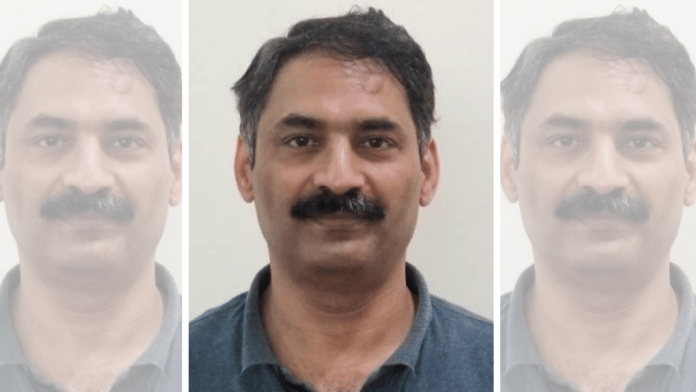New Delhi: A Pakistani journalist’s latest investigation into nepotism by the Army Chief has riled up the country’s all-powerful Army. His family is now under attack.
Days after Ahmad Noorani was served with multiple FIRs under the amended Prevention of Electronic Crimes Act (PECA) for his tweets on Balochistan, his report on how General Asim Munir’s influence over civilian institutions has reached “unprecedented heights” led to a midnight raid on his home in Islamabad Tuesday and alleged enforced disappearance of his two brothers—an act that saw an international outcry over the repression of dissent in Pakistan.
The charges against Noorani are rooted in his reporting on the Pakistan Army, particularly allegations of nepotism involving its chief Asim Munir’s family. Noorani’s story claimed that the relatives of Munir were being handed key federal positions due to their familial ties.
The journalist described the piece as “straightforward” in exposing the “nepotism of the family”.
“All I did was straightforward reporting on the nepotism prevalent in the family. His (Gen Munir) relatives and close associates have openly interfered in key government appointments, securing top positions despite their lack of merit or performance, highlighting the military’s unchecked dominance and misgovernance in Pakistan,” Noorani told ThePrint.
The Washington-based journalist alleges that his brothers have been kidnapped with no due legal procedure and that his family has been unfairly targeted.
“This is a state of lawlessness in Pakistan. Due to my reporting on Pakistan Army Chief General Asim Munir, the ISI and Islamabad Police raided my home in Islamabad and tortured my two brothers in front of our mother. Despite repeated requests, they refuse to let them go and have kept them at an undisclosed location,” Noorani added.
His mother, the investigative journalist said, petitioned the Islamabad High Court on Wednesday for the recovery of her two sons.
“Ahmad Noorani’s two brothers have been forcibly disappeared from their home in Islamabad in retaliation for Noorani’s reporting on COAS. In any civilised country, the habeas petition would have been fixed for same day hearing today but in managed IHC, this was not possible,” Noorani’s lawyer and human rights activist Imaan Mazari wrote on ‘X’ .
The violent actions against Noorani’s family mark a new low in the ongoing battle between Pakistan’s military on one side, and the press, opposition parties, and activists on the other.
Pakistani journalists and international organisations have rallied behind Noorani following the incidents. Human rights body Amnesty International has called on Pakistani authorities to immediately disclose the whereabouts of Noorani’s brothers and ensure their safe return. It also demanded a prompt, impartial investigation into their disappearance and accountability for those responsible.
PAKISTAN: Today’s early morning raid on journalist Ahmad Noorani’s house in Islamabad and the enforced disappearance of his two brothers is a sign of relentless repression of dissent in the country. The absurd hounding of family members for the critical work of a journalist based…
— Amnesty International South Asia, Regional Office (@amnestysasia) March 19, 2025
Noorani, meanwhile, is no stranger to controversy. Last week, the Pakistani government filed charges against Noorani under PECA for his tweets on Balochistan post the train hijack in Bolan. He was accused of spreading false information, inciting public hatred, and promoting anti-state propaganda. His social media posts were alleged to have undermined trust in state institutions and to have promoted a banned organisation—an accusation Noorani vehemently denies.
Clampdown on journalists
Pakistan ranks 152 out of 180 countries in press freedom, according to Reporters sans Frontières, or Reporters Without Borders.
In January, the Pakistan government brought amendments to the PECA Act which grant the government sweeping powers to regulate social media, with penalties including up to three years in prison and fines for spreading “fake news” or promoting banned organizations. The law’s broad definitions and severe penalties are seen as an effective tool to silence critics of the government and military.
Noorani has long been a thorn in the side of the military. His investigative work has spanned corruption in the Pakistan Army, the China-Pakistan Economic Corridor (CPEC) projects, and sensitive topics such as blasphemy.
In 2020, Noorani received over 100 death threats following his report on businesses, including 99 companies across four countries, of those related to Lt. Gen. Asim Saleem Bajwa (retired). Bajwa had denied the allegations and offered his resignation as an adviser, which then prime minister Imran Khan rejected.
“The state of journalism in Pakistan is in a terrible state. Pakistan has great journalists, but every journalist has learned their lesson. If we are to stay here and do such well-meaning journalism, we cannot say anything against the military, which is the actual ruler of the country. There is no hope of recourse from the government as well, which is completely in the control of the Army and came to power through a rigged election in 2024. They have no legitimacy on their own,” Noorani said.
(Edited by Tony Rai)






